October 16, 2024 - Ontario’s current attack on bike lanes as a remedy for congestion is “government overreach” says Toronto Mayor Olivia Chow, while Ward 14 Coun. Paula Fletcher called it an “over the top reaction”.
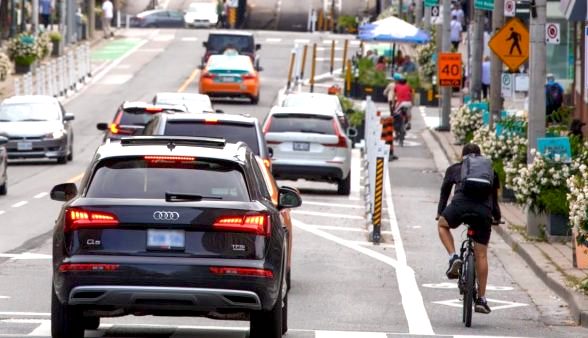
Green Party of Ontario deputy leader and Kitchener Centre MPP Aislinn Clancy argued the government doesn’t have a “serious solution” to address gridlock echoed by Ottawa NDP MPP Joel Harden who commented, “This is nonsense from a government that has clearly run out of ideas.” We couldn’t agree more.
The province’s plan to introduce legislation that gives Transport Minister, Prabmeet Sarkaria final approval before municipalities build any new bike lanes that remove car lanes also flies in the face of a recent Nanos Survey for CTV that says 54% of Canadians vs 41% support bike lanes that remove car lanes.
The move follows recent exaggerated and false claims by Premier Doug Ford regarding bike lanes i.e. affecting emergency vehicles that were fact-checked and debunked by CBC News – read the full report here.
In fact, Sarkaria wants to examine data from municipalities on bike lane projects initiated in the last five years that replaced car lanes to possibly reverse them.
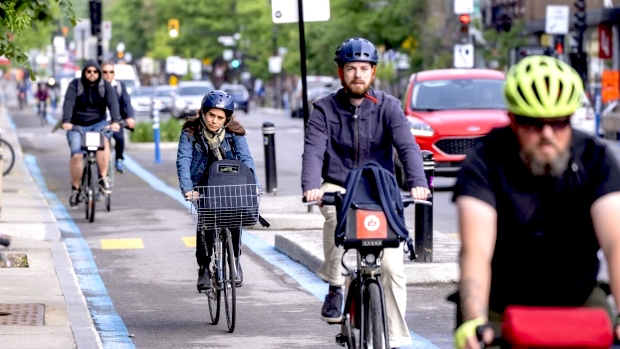
Yet Sarkaria and Ford need only look 550km eastward to see how it’s being done in Montreal, a poster child for cycling. The city has announced plans to invest $30 million in 2024 with 29 projects planned across 13 boroughs and three linked cities, part of Montreal’s 2023-2027 Bicycle Vision unveiled in 2022 that will see 200 km of new secure bikeways installed over a 5-year period – read the full report here.
The Minister claims that he wants Toronto to be a world-class city but the province’s new legislation seems aimed at stunting the city’s efforts to catch up to other leading cities like Paris, France and London, UK, where cyclists are now reported to outnumber car drivers – see links below.
According to a City of Toronto study, bike lanes on Bloor St. W. saw a 56% increase in cyclists, positive economic impact for businesses, and improved safety for all road users among other benefits – read more here.
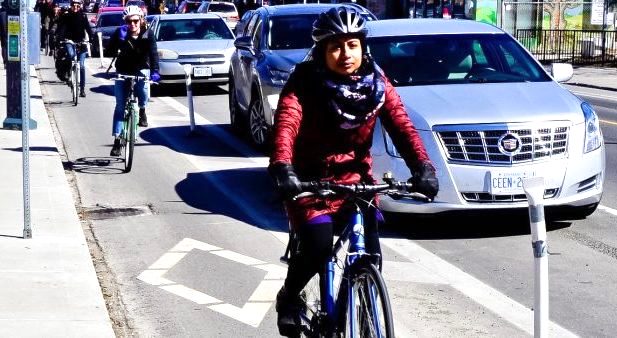
At the press conference Transport Minister, Prabmeet Sarkaria had little to show when asked for bone fide data to support his claims that bike lanes are causing gridlock.
Christine Hogarth MPP — Etobicoke–Lakeshore talked about a survey her office did regarding protected lanes installed in Etobicoke in 2023 that did not favour them. Sam Pappas, owner of The Crooked Cue, representing Balance on Bloor, a coalition of residents, business owners and daily commuters within Etobicoke and Bloor West Village claimed more oppose bike lanes than support them.
Yet current studies/data world-wide support bike lanes – in fact recent research shows that bike lanes can lead to reduced car speeds by up to 28% – read more here.
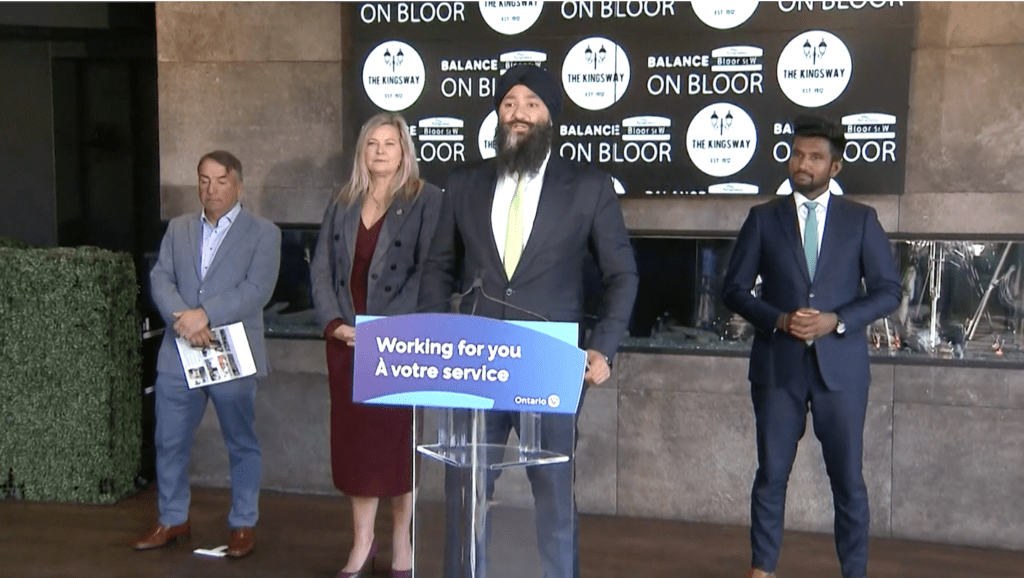
Of Toronto’s estimated 5,600 km of roads a very small percentage, only about 4%, are devoted to on-street cycling infrastructure estimated at around 290km, much of which has only been recently established along major routes such as Bloor St., Yonge St. and Danforth Ave.
Yet the city’s traffic and congestion issues have been a long-standing problem – read more here – so any suggestion that bike lanes are the issue don’t hold water. In fact, the opposite is true claim advocates which the data supports.
Cycling’s merits for mobility, health, environment and more, have long been documented by the Dutch and others, and that knowledge and expertise is currently spreading around the globe like wildfire, because it’s sensible and it works.
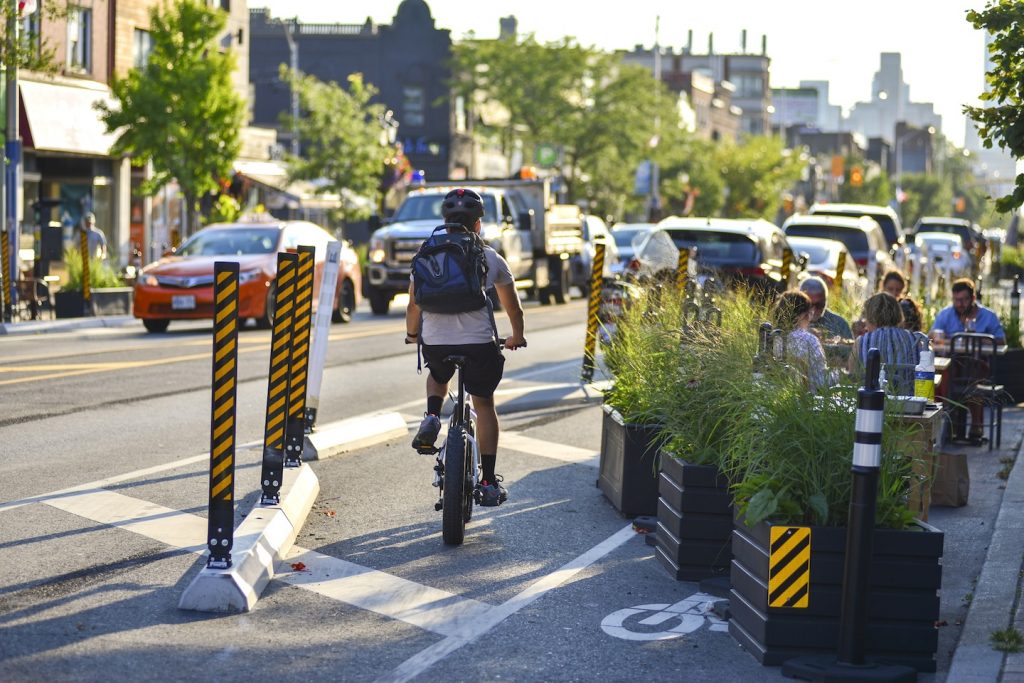
Safety is the most important issue for all road users including cyclists (echoed by Ford), and protected bike lanes are the safest for cyclists and car drivers, give people options, get them out of cars, keep them healthy, help the environment, save people time and money, and cyclists outspend motorists as well – see links below.
Local politicians say the province should focus on finally getting the Eglinton Crosstown and Finch LRT open which will have a huge impact on congestion in Toronto, open up Highway 407 for trucks and freight, or tackle the crisis in health care, not “steamroll municipalities and propose fantasy tunnels”.
Sakaria stated, “…what we need is a common sense, evidence-based bike lane policy”. We agree and encourage the Minister to review and take into account the bona fide data mentioned, and also below, which represents a only a small portion of the research supporting bike lanes, and cycling as a valued and important mobility option.
At the press conference the Minister also cited a study by satellite navigation company TomTom that found Toronto had the third-slowest average traffic travel times out of 387 cities surveyed, which is where the city is likely to stay unless Ontario takes the benefits of cycling, bike lanes, and rapid mass transit more seriously.
Nanos Survey for CTV
Says 54% of Canadians vs 41% support bike lanes that remove car lanes – read the full report/survey here.
Ontario vs Bike Lanes
A comprehensive overview of the issues regarding safety for vulnerable road users, bike lanes, congestion and the government’s role and failure to address these issues and more here.
Emergency Vehicles
The Minister mentioned the impact on emergency vehicles, also touted as a problem by Premiere Doug Ford, yet the CBC fact-checked Ford’s comments debunking his exaggerations and falsehoods. In an email to CBC Toronto on Sept. 24, the city said emergency services have not raised concerns about facing difficulties due to bike lanes – read the full report here.
Bike Share Toronto Breaks More Records
Ridership has grown substantially each year since 2015, when 665,000 trips were recorded. So far this year, riders in Toronto have taken 4.7 million Bike Share trips, already overtaking total ridership in 2022 and fast approaching the 5.7 million mark set in 2023, according to Bike Share Toronto director Justin Hanna – read more in CBC News here (bike share is also way up in London, UK here).
Study After Study Proves Bike Lanes are Good for Business
Four decades’ worth of research proves that making streets friendlier for bikes — and sidewalks friendlier for pedestrians — is actually good for business, yet some business owners continue fighting bike lanes coast to coast reports Business Insider. Survey after survey has shown that business owners overestimate how many of their customers drive to their stores, versus walking or biking. In one case study in Seattle when bike lanes replaced 12 parking spaces, sales quadrupled – read more here.
Montreal, Que.
The City of Montreal has announced plans to invest $30 million in 2024. With 29 projects planned across 13 boroughs and three linked cities, the current $30 million investment is part of Montreal’s 2023-2027 Bicycle Vision unveiled in 2022 that will see 200 km of new secure bikeways installed over the next five years. This includes 10 new axes of the Réseau express vélo (REV) and 60 km of additional cycle paths for the second phase of the REV – read the full report here.
Paris, France
Cyclists now outnumber drivers in Paris under Mayor Anne Hidalgo according to a study by Institut Paris Region that indicates 30% of trips are made by bicycle. Hidalgo established 1,000km (620 miles) of bike routes, 350km of them protected lanes including sealing off famous streets such as the Rue de Rivoli to most traffic – read more about the Institut Paris Region study here and in The Guardian here.
London, UK
Transport for London has proudly announced that the number of cycle lanes in the capital has doubled since Sadiq Khan became mayor in 2016. The authority has expanded the routes from 56 miles eight years ago to a stunning 223 miles today in a sweeping inflation of pedalling power across the city – read more here – and cyclists outnumber London motorists according to Forbes here.
California
California Governor Gavin Newsom signs complete Streets Bill SB 960 for cyclists, walkers and transit. Complete Streets are safe and comfortable streets for people biking, walking, rolling, and taking transit, as well as driving motor vehicles. Protected bikeways, a key element of many Complete Streets, have been shown to reduce fatalities and injuries for road users in all modes of transportation – read more here.
Study Shows Bike Lanes Reduce Car Speeds by 28%
A new ScienceDirect study shows that the effect of delineator-protected bicycle lanes (marked with traffic cones and plastic delineators) was associated with a 28% reduction in average maximum speeds and a 21% decrease in average speeds for vehicles turning right – read the full report here.
Read more in CBC here.
Read Ontario’s official release here.
Read more in City News Everywhere here.

















